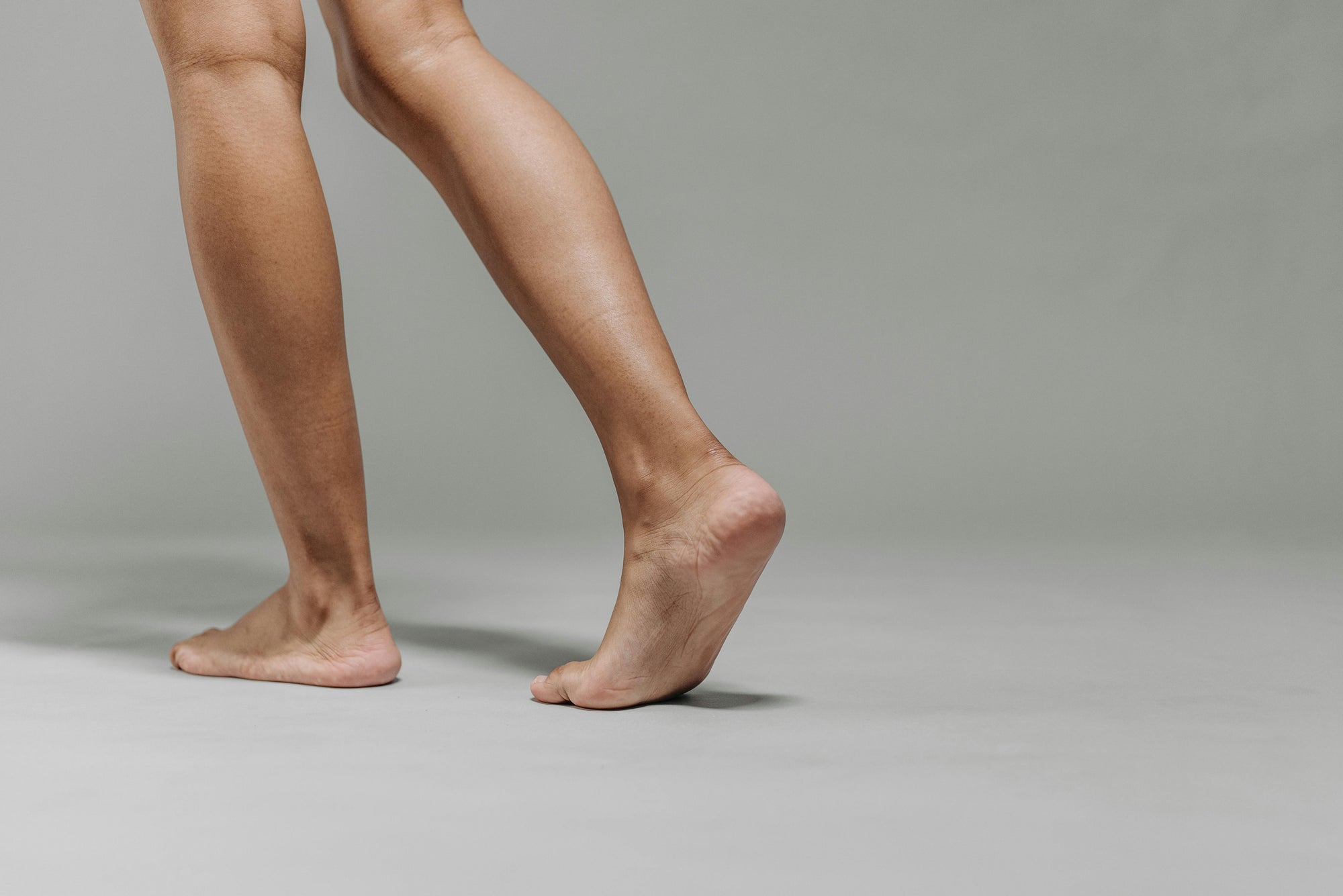When your feet sweat and mix with bacteria, it can lead to foot odor because the feet have an abundance of sweat glands that can be quite active in perspiration compared to parts of the body. Foot odor isn't always a sign of hygiene shoes or socks that don't let your feet breathe and synthetic socks can also contribute to smelly feet.
Discover a range of foot care essentials, at Beauty Market Online that are both natural and recommended by dermatologists, to combat foot odor while also providing nourishment and protection for your skin barrier. Choose from sprays and cleansing soaks to healing balms and exfoliating scrubs that offer lasting benefits without any chemicals.
Common Habits That Make Foot Odor Worse
Many people struggling with foot odor don’t realize that small, everyday habits may be making the problem worse. Some of these include:
Wearing the Same Shoes Every Day
Shoes need time to dry out completely. Repeating the same pair without giving them a day to air can trap moisture, allowing bacteria to grow.
Choosing the Wrong Socks
Fabrics such, as polyester or nylon have a tendency to retain heat and moisture whereas natural materials, like cotton or bamboo are known for their breathability and ability to minimize sweat accumulation.
Skipping Proper Drying After Showers
Moisture left between the toes is one of the most common causes of fungal growth, which often leads to stronger, more persistent odors.
Using Harsh Soaps or Skipping Cleansing Altogether
Using soaps can remove the skin's protective barrier and not washing properly can lead to a buildup of sweat and bacteria over time.
How to Break the Cycle
-
Wash and dry feet thoroughly, especially between toes.
-
Rotate shoes and avoid back-to-back use.
-
Choose moisture-wicking socks (bamboo or merino wool).
Natural Remedies That Actually Work
If you want to keep your space smelling fresh without resorting to products filled with chemicals there are remedies supported by a combination of scientific research and long-standing practices.
Apple Cider Vinegar Soaks
Apple cider vinegar helps create an environment that's less favorable for odor-causing bacteria to grow in your foot-soaking solution: Vinegar and warm water for a 15-minute soak routine repeated 2 times weekly.
Baking Soda and Essential Oils
Try using baking soda to soak up dampness and eliminate smells, in your shoes. Add tea tree or lavender oils for their properties and a nice fragrance! Scatter the mixture inside your shoes. Rub it on your feet before wearing socks.
Activated Charcoal Inserts
Charcoal is popular, for its ability to naturally eliminate odors, making it effective, for keeping shoes smelling fresh and preventing lingering smells caused by sweat.
These solutions work well for dealing with slight smells and can be seamlessly integrated into your daily routine, with minimal hassle.
Dermatologist-Approved Ingredients for Persistent Odor
If traditional remedies don't do the trick some people dealing with persistent foot odor problems on a basis might find relief, in products containing ingredients recommended by dermatologists.
Zinc Oxide
Zinc oxide is commonly found in talcum powders and sprays to soak up moisture and counteract odors without irritating the skin.
Salicylic Acid
This ingredient exfoliates dead skin cells, which reduces the buildup of bacteria-harboring debris.
Clotrimazole and Tolnaftate
These antifungal medications work well to prevent odors resulting from infections such, as athlete's foot, when there is noticeable redness or itching, between the toes.
Look for products that combine antibacterial, antifungal, and moisturizing properties for a well-rounded solution. For example, Beauty Market Online’s antiseptic foot spray, enriched with eucalyptus and mint, offers instant freshness while addressing bacteria on contact.
Hygiene Habits That Help Break the Cycle
For most people, foot odor isn’t a hygiene issue it’s a hygiene habit issue. Even those who shower regularly may overlook key practices that make all the difference.
Wash Correctly
Use a gentle antibacterial cleanser and give attention to every part of the foot: soles, heels, nail beds, and especially between the toes. Harsh soaps can dry out the skin, making it crack or peel—creating more places for bacteria to live. For effective daily cleansing, look for pH-balanced foot washes that cleanse without stripping natural oils.
Drying Is Just As Important As Washing
Pat your feet dry with a clean towel, and don’t forget the spaces between your toes. Excess moisture is one of the leading causes of both odor and fungal issues like athlete’s foot.
Moisturize, But Choose Wisely
Dry feet can lead to cracked skin and calluses, which trap bacteria. Use a lightweight, non-greasy foot cream that moisturizes while offering antimicrobial benefits.
The SPA REDI Body & Foot Cream Mask, Hydrating & Refreshing for Tired Skin is a great weekly treatment to restore hydration without leaving your feet oily
Footwear Choices That Affect Odor Control
Your shoes play a major role in whether your feet stay fresh or start to smell. It’s not just about the design it’s about the materials and how often you wear them.
Choose Breathable Materials
Canvas, mesh, leather, and bamboo-based fibers allow air to circulate and sweat to evaporate. Avoid plastic or synthetic linings, which trap moisture and increase heat.
Rotate Your Shoes
Wearing the same pair every day gives them no time to dry out. Letting each pair rest for at least 24 hours helps reduce bacteria growth and keeps them fresher longer.
Clean and Deodorize Shoes Regularly
Every 1–2 weeks, sprinkle baking soda inside shoes and leave it overnight. Shake it out the next day before use. For deeper cleaning, use a shoe spray or antibacterial wipes.
How to Treat Shoes, Socks & Insoles the Right Way
Many people focus on their feet but overlook their socks and insoles—both of which directly influence odor levels.
Best Sock Fabrics for Odor Control
-
Cotton-blend or bamboo socks wick away sweat and resist bacterial buildup.
-
Wool (like merino) offers natural antimicrobial properties and temperature regulation.
How Often Should You Change Socks?
Always change socks after exercise or extended walking. If your feet sweat heavily, changing midday can prevent buildup and reduce odor.
When to Replace Insoles or Footwear
Even the best shoes have a lifespan. Insoles should be replaced every 6 months; shoes that retain odor after cleaning should be replaced entirely.
Understanding When Foot Odor Is a Medical Issue
If you’re practicing good hygiene, rotating your shoes, and using the right products and still experiencing persistent odor it may be a sign of a deeper issue.
-
Hyperhidrosis (excessive sweating): Causes constant dampness even at rest.
-
Tinea Pedis (athlete’s foot): A fungal infection often starts with itching and scaling.
-
Bromodosis: Chronic foot odor caused by sweat glands overproducing and bacteria becoming embedded in skin layers.
When to See a Dermatologist or Podiatrist
Seek medical help if you notice:
-
Cracking or peeling between toes
-
Persistent itchiness
-
Strong odor that returns within hours of cleaning
-
Discoloration or thickening of nails
Early diagnosis can prevent infections from worsening and spreading.
The Power of Consistency in Your Foot Care Routine
Just like facial skincare, foot care only works when it becomes a regular routine. You don’t need a complicated regimen—just a thoughtful one.
Morning Routine (AM)
-
Wash with mild soap
-
Dry thoroughly, especially between toes
-
Apply a cooling spray or antibacterial powder
-
Wear breathable socks and clean shoes
Evening Routine (PM)
-
Soak feet in warm water with baking soda or essential oils (2–3 times per week)
-
Use a gentle scrub to remove dead skin. For exfoliation, try SPA REDI Sugar Body Scrub Lavender & Wildflower, which gently removes buildup while calming the skin.
-
Apply a nourishing foot cream or mask
-
Wear clean, dry socks to lock in moisture overnight
Conclusion
Foot odor is common but completely manageable. By understanding its root causes and using natural plus clinically approved solutions, you can keep your feet clean, fresh, and healthy. Explore Beauty Market Online's Foot Care Collection to build your daily odor-free ritual today.
FAQs
Q1: Can foot odor go away completely?
Yes. With consistent care and the right products, foot odor can be fully managed or eliminated.
Q2: Are sprays better than powders?
Sprays are best for moisture control and powders are ideal for shoe and sock deodorizing.
Q3: How long should I soak feet for odor relief?
10–20 minutes, 2–3 times a week, depending on severity.
Q4: Can foot odor be genetic?
Yes. Some people naturally sweat more or have a stronger skin microbiome.
Q5: What's the fastest fix for smelly feet?
Clean, dry, apply spray, change socks—repeat daily.



